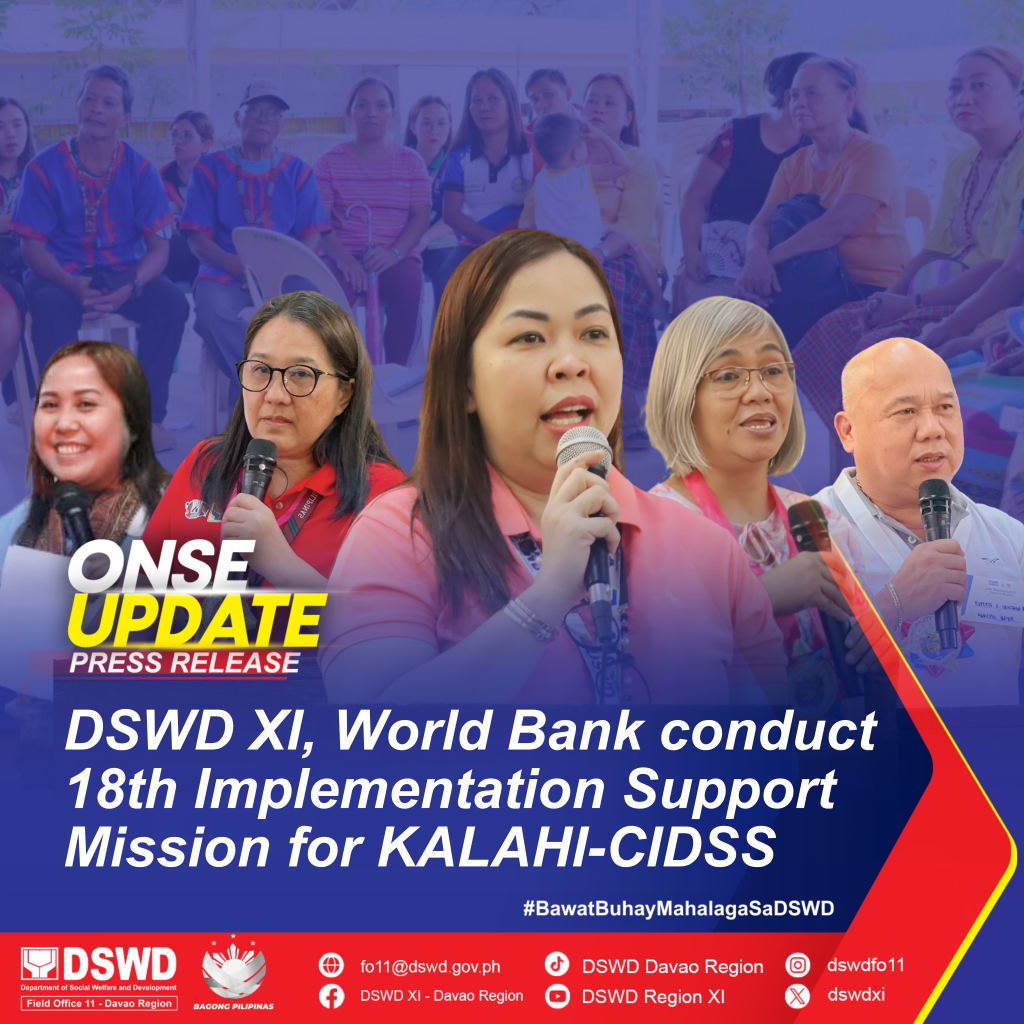
The Department of Social Welfare and Development (DSWD) Field Office XI, in collaboration with the World Bank, hosted the 18th Implementation Support Mission (ISM) for the Kapit-Bisig Laban sa Kahirapan-Comprehensive and Integrated Delivery of Social Services (KALAHI-CIDSS) program. The mission, held from September 9 to 13, 2024, focused on evaluating the program’s progress as part of the closing activities of the National Community-Driven Development Program-Additional Financing (NCDDP-AF). It also served as a preparatory step for the new modality, ‘Panahon ng Pagkilos: A Philippine-Locally Led Climate Action Project,’ which will be launched next year.
The ISM is a regular activity jointly conducted by the DSWD and the World Bank to assess whether the DSWD is meeting the loan covenants and performance targets for the KALAHI-CIDSS program. It involves consultations with development partners, DSWD management, key program officers, government agencies, local government units, and community volunteers.
The first day of the mission took place in the Municipality of Mawab, Davao de Oro, where the team met with local leaders and community volunteers. A series of focus group discussions (FGDs) were held, engaging community leaders and volunteers who had been involved in KALAHI-CIDSS projects. These discussions centered on the impact of community-driven development initiatives in reducing poverty and improving local governance. The team also visited infrastructure projects funded by KALAHI-CIDSS, such as multi-purpose buildings and barangay isolation units, which have been vital in improving the quality of life for residents.
On the second day, the ISM team visited the Municipality of Nabunturan, Davao de Oro where they met with a community mainly comprised of the members of the Indigenous Peoples (IP) communities who embraced the program as their focus on community-driven initiatives related to disaster resilience and climate adaptation. Community consultations highlighted the success of local projects, including disaster risk reduction measures which are aligned with the goals of the upcoming Panahon ng Pagkilos initiative. The mission team acknowledged the strong partnership between the DSWD and the local government, emphasizing how these efforts contribute to building more resilient communities.
On the third day, the ISM team visited the Provincial Government of Davao del Sur for a consultation dialogue with provincial representatives on the future of the KALAHI-CIDSS program. The discussions centered on the ongoing KALAHI-CIDSS implementation and the transition to the Panahon ng Pagkilos project. The dialogue focused on how the new modality will build on the successes of KALAHI-CIDSS and adapt to the challenges posed by climate change. Provincial government representatives expressed their support for the new program, recognizing its potential to further empower communities in addressing local issues through sustainable solutions.
During the focus group discussions, a common theme that emerged from the community volunteers was that the true value of KALAHI-CIDSS extended far beyond the physical subprojects. The volunteers shared how the program empowered them by giving them a voice in decision-making and enabling them to actively participate in identifying and solving their own community’s challenges. Many spoke about how they gained confidence in managing projects, ensuring transparency, and being accountable for the resources used. They emphasized that this sense of ownership and responsibility had not only improved local governance but also strengthened their unity as a community. For them, the most lasting impact of the program wasn’t just the infrastructure built, but the empowerment it instilled in them to take charge of their development long after the projects were completed.
The World Bank team, led by Maria Benilda E. Redaja and Corinne A. Canlas as Consultants, included key experts such as Melissa Agustines Santiago-Yan (Procurement Specialist), Maria Liennefer Rey Penaroyo (Financial Management Specialist), and Karen Joy Mamaril (Social Development Specialist).
From the KALAHI-CIDSS National Program Management Office (NPMO), the delegation included Sachiko Ann S. Bulayungan (Engineering Division Chief and Team Leader) representing the National Program Manager (NPM) Atty. Bernadette A. Mapue-Joaquin, alongside specialists in social development, procurement, and finance.
The DSWD Field Office XI Regional Director, Atty. Vanessa B. Goc-ong led the KALAHI-CIDSS Regional Program Management Team (RPMT), which provided full support for the mission activities. The RPMT included Deputy Regional Program Manager Giovani R. Yugo and various unit heads who actively participated in the consultations and site visits.
“We sincerely thank the representatives from the World Bank for your commendation of our implementation of the KALAHI-CIDSS program here in the Davao Region. Your valuable inputs and recommendations will serve as our guide as we transition to the new modality next year—the Panahon ng Pagkilos,” Director Goc-ong stated during the mission’s exit conference and feedback session.
The 18th ISM highlighted the KALAHI-CIDSS program’s accomplishments under the NCDDP-AF and paved the way for its future under the Panahon ng Pagkilos initiative. As the program transitions into a climate action-focused framework, the DSWD and the World Bank expressed confidence in the continued success of community-driven projects in fostering sustainable development and climate resilience at the grassroots level.
#MagKALAHITayoPilipinas
#BawatBuhayMahalagaSaDSWD

